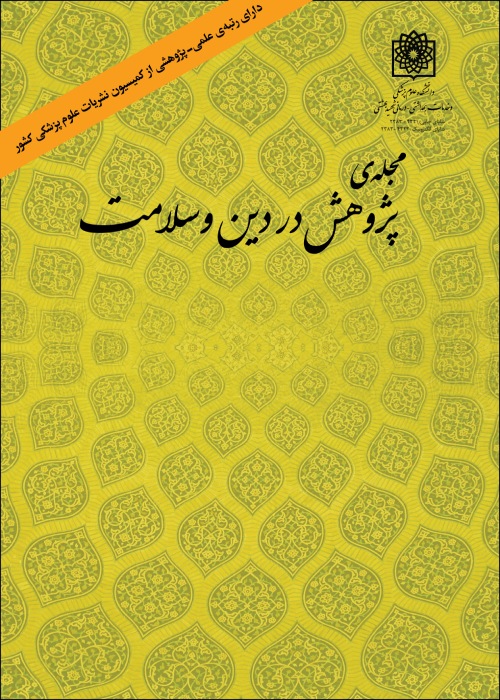Psychometric Properties of Spiritual Self-esteem Questionnaire Adopting Islamic Approach
Author(s):
Article Type:
Research/Original Article (دارای رتبه معتبر)
Abstract:
Background and Objective
Research has shown that self-esteem plays a significant role in mental health. Since the existing self-esteem scales lack spirituality dimension, the purpose of this study was to construct a spiritual self-esteem questionnaire with Islamic approach and to validate.
Method
This study was a combination of qualitative (descriptiveanalytical) and quantitative research. Firstly, verses and narrations related to the sense of spiritual value and ability were collected, categorized and analyzed. The structure of spiritual self-esteem, including ten components, was designed. The components included belief in the ability and position of man by God, belief in one's value through righteousness, divine reliance, feeling close to God, serious relationship with people, lack of feeling of need to people, self-acceptance, spiritual purposefulness, spiritual integrity, sense of control. Experts then confirmed the content validity of the components. Subsequently, the characteristics of each component were determined and fitted to each characteristic. The first questionnaire, along with a self-esteem questionnaire (Rosenberg) and spiritual health (Polotzin and Ellison), was administered among 204 participants selected through random cluster sampling from 6 available universities in Qom and Tehran. In analyzing the findings, the coefficient of detection, difficulty, Pearson correlation, exploratory and confirmatory factor analysis, Cronbach's alpha coefficient were used. All ethical issues were observed in this study and the authors of the article have not reported any conflicts of interest.
Results
The results showed that the final questionnaire of spiritual selfesteem consists of 7 components: belief in spiritual empathy, trust and divine help, feeling close to God, feeling of control, spiritual integrity, serious relationship with the people, self-acceptance and 25 items in the Fourth Likert scale. Structural validity was assessed through exploratory and confirmatory factor analysis, which was desirable (CFI=0.77), as well as reliability of the questionnaire by Cronbach's alpha (0.897) using semistructured method, Spearman (0.831) and Gutman (0.825). The relationship between spiritual self-esteem with self-esteem (0.447) and spiritual well-being (0.7677) was positive and significant (P<0.001); therefore, the validity of the questionnaire is also relatively favorable.
Conclusion
The spiritual self-esteem questionnaire with Islamic approach consists of seven components and has a desirable validity and reliability.Keywords:
Language:
Persian
Published:
Journal of Pizhuhish dar din va salamat, Volume:5 Issue: 1, 2019
Pages:
29 to 46
magiran.com/p1946803
دانلود و مطالعه متن این مقاله با یکی از روشهای زیر امکان پذیر است:
اشتراک شخصی
با عضویت و پرداخت آنلاین حق اشتراک یکساله به مبلغ 1,390,000ريال میتوانید 70 عنوان مطلب دانلود کنید!
اشتراک سازمانی
به کتابخانه دانشگاه یا محل کار خود پیشنهاد کنید تا اشتراک سازمانی این پایگاه را برای دسترسی نامحدود همه کاربران به متن مطالب تهیه نمایند!
توجه!
- حق عضویت دریافتی صرف حمایت از نشریات عضو و نگهداری، تکمیل و توسعه مگیران میشود.
- پرداخت حق اشتراک و دانلود مقالات اجازه بازنشر آن در سایر رسانههای چاپی و دیجیتال را به کاربر نمیدهد.
دسترسی سراسری کاربران دانشگاه پیام نور!
اعضای هیئت علمی و دانشجویان دانشگاه پیام نور در سراسر کشور، در صورت ثبت نام با ایمیل دانشگاهی، تا پایان فروردین ماه 1403 به مقالات سایت دسترسی خواهند داشت!
In order to view content subscription is required
Personal subscription
Subscribe magiran.com for 70 € euros via PayPal and download 70 articles during a year.
Organization subscription
Please contact us to subscribe your university or library for unlimited access!


